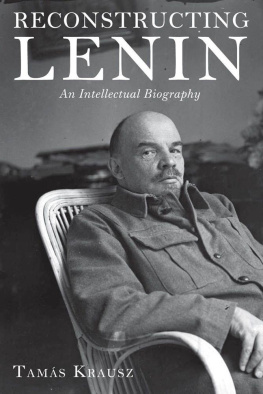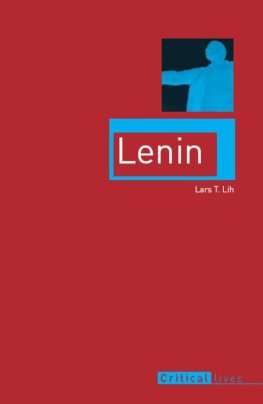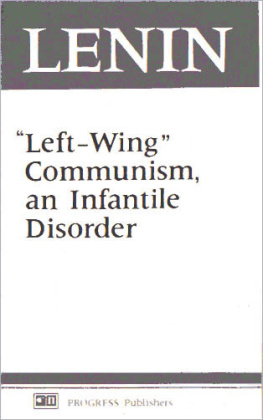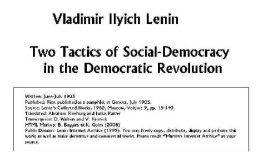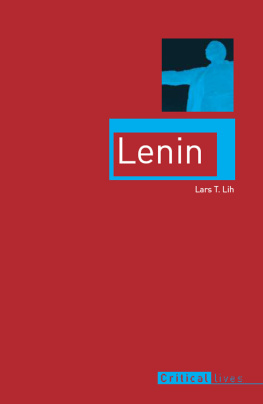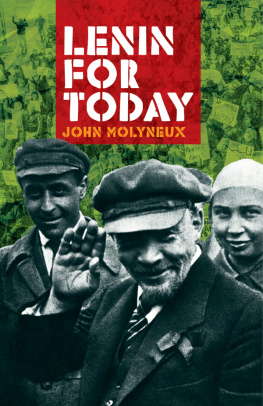Reconstructing Lenin
RECONSTRUCTING LENIN
An Intellectual Biography
TAMS KRAUSZ
translated by BLINT BETHLENFALVY
with MARIO FENYO

Copyright 2015 by Tmas Krausz and Monthly Review Press
English translation copyright Eszmlet Foundation
All Rights Reserved
Library of Congress Cataloging-in-Publication data available
from the publisher
ISBN pbk 978-158367-449-9
ISBN cloth 978-158367-450-5
Monthly Review Press
146 West 29th Street, Suite 6W
New York, New York 10001
www.monthlyreview.org
5 4 3 2 1
Images following reproduced by courtesy of the Russian State Archive of Socio-Political History (RGASPI) and the Russian State Documentary Film and Photo Archive at Krasnogorsk (RGAKFD).
Complete copyright details may be found on .
The publication of this book was made possible by the generous support of the National Cultural Fund of Hungary and by the Foundation for Russian Language and Culture.

Contents
Preface
MARXS FAMOUS THESIS, The knell of capitalist private property sounds. The expropriators are expropriated, was derived from the contradictions of modern society. But it was Vladimir Ilyich Lenin who first gave this thesis the bearings of an applied program and objective. Even seen from a distance of decades, the first conscious historical experiment aimed at realizing a stateless society (communism), the Russian Revolution, which eliminated the capitalist system of labor, labor distribution, and social classes, is the lasting achievement of Lenin and his revolutionary associates. At the same time, as founder of the Soviet state, Lenin is inextricably bound up with the seven decades of Soviet history that sprang from this antistate, anticapitalist experiment.
Even though, for more than two decades, there have been no large organizations, movements, or political parties in Europe of national or international consequence that are promoting social revolution or either state or stateless socialism in any form, the disputes about Lenin in political theory and specialized areas of historiography have not abated either in Russia or in the rest of the world. Since 1991 it has been clear that the major, community-oriented, socialist perspectives have faded from political practice globally. In such periods, not only historians but intellectual and political groups engaged in surmounting modern bourgeois society along humanist lines attempt to consider the causes of their marginalization, while taking stock of their traditions. They seek to understand the precedents of these traditionstheir sources and their roots, and how thought and praxis changed the course of civilization.
In this all-encompassing story, Leninalong with Plekhanov, Martov, Kautsky, Rosa Luxemburg, George Lukcs, Gramsci, a long listcertainly had a fundamental role that cannot be overlooked, even in the twenty-first century. Nonetheless, While it is obvious that Lenins Marxism was essentially of a political nature, and shaped his political struggles, it also had a grasp on virtually all the definitive problems of his ageproblems that are undeniably still being reconsidered, under completely new conditions.
These interpretations, however, not only preserve the old misconceptions but add the prejudices of our own times. The problem lies in Lenin himself. His legacy allows for a variety of interpretations because, in reality, a variety of Lenins existed, and in spite of the inner unity and coherence of his actions he waged a constant struggle upon and within himself. For instance, the immediate pressures of the movement as he tried to escape the clutches of the secret police in 1917 dictated a stance quite different from the theoretician whose concern was to liberate all of humankind. Still another Lenin stands before us during the civil war, at the peak of power, submerged in the terror; and contours of yet another Lenin emerge if we consider his revolutionary and theoretical legacy after 1922, with his gaze fixed in the distance as he lies seriously ill. There is room for both the Lenin of autumn 1917, who aimed to sweep all state power off the board (think of The State and Revolution), and the Lenin who came after October 1917, a politician and statesman trying to organize the Soviet state. Nonetheless, to subsume Lenins theoretical work under his pragmatic political measures, often dictated by mere necessity, is to commit a serious methodological error. And as we shall see, distortions of this kind can be carried through on the basis of rather different, even contradictory, worldviews. Meanwhile, notwithstanding all of Lenins inner struggles, there existed a line of intellectual development that holds his lifework together. This book explores the difference and the unity between these various Lenins.
The subject of this book is not unprecedented within the Hungarian field of Lenin research. A publication by Georg Lukcs of what he called an occasional study on the unity of Lenins thought came out as early as 1924.views. It may seem that the present historical constellation is not suited for an objective approach to Lenin research, but in fact the opposite is true. No current political topicality, no matter its weight, drives the issue as it pleases through the gates of historyand the historical sciences.
On the other hand, there are indeed books that seem to have been written for no logical reason since they are so alien to the spirit of their times; their subject seems obsolete. Yet in many a case the opposite may turn out to be true at some future time (as in the case of Ervin Szab, Trotsky, or Bukharin). And if the history of the Lenin phenomenon is given some thought, the timeliness of research on him may become clear. The recent memory of innumerable studies, brochures, and books appearing on Lenins life and work during the decades of state socialism still haunts Hungary. The first Hungarian historian to speak about Lenin seriously was Gyula Szekf. In a memorial speech in January 1948, as Hungarian ambassador to Moscow, he spoke in recognition of Lenins significance as a statesman and state builder, and the speech soon appeared in print.
The Lenin centenary was, in a sense, an event of great consequence. It seemed like a turn of some sort, even from a Hungarian vantage point. The time was, after all, the aftermath of 1968 and the rise of the new left. It may be found rather surprising, but in 1970, the one hundredth anniversary of Lenins birth, Professor Gyrgy Rnki held a critical Lenin seminar in the history department of Debrecen University (Hungary) as part of the academic memorial celebrations, while his teaching assistant, a young Lajos Menyhrt, addressed the Lenin theme in line with his own main interests. At literary evenings, students from the Kossuth Lajos University of Sciences and Etvs Lrnd University made declarations denouncing the social inequalities of the day with demonstrations of a leftist critique of the prevailing system. For the Hungarian intelligentsia, the literary Lenin of the Hungarian writer Lszl Gyurk crowned the memorial celebrations. His Lenin, Oktber (Lenin, October) elevated the leader of the revolution from the clichs of boring propaganda publications.
In fact, a sort of reevaluation had already begun in the 1960s. it did not remain without some influence within the world socialist system, though of course no serious effect upon the intellectual life of the Soviet Union can be attributed to it.
Next page
